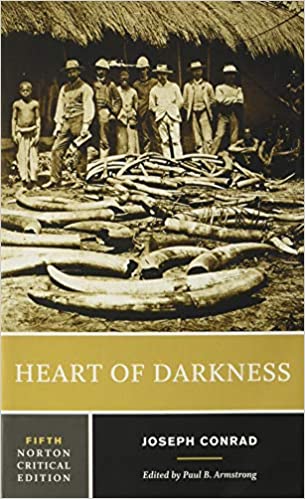Heart of Darkness by Joseph Conrad
Event Details
SALON DETAILS: Facilitated by Keith Fosbrook Three-week virtual study,
Event Details

SALON DETAILS:
- Facilitated by Keith Fosbrook
- Three-week virtual study, 13, 20, 27 January 2022
- Thursdays, 6-8.00 pm
- Cost £75
- Recommended text: Fifth Norton Critical Edition ISBN 9780393264869
In 1890, Joseph Conrad was employed by a Brussels-based company as a steamboat captain on the Congo River. Although his job was supposedly to last for three years, he quit after just one trip up and down the river between Kinshasa and Kisangani. It is no exaggeration to say that he was in a state of physical and psychological collapse, brought on by his exposure to a European regime of greed, violence and hypocrisy. Nine years later, he used this experience as the basis for his novel Heart of Darkness.
This book has become one of the most famous and widely read works of fiction in English. The very title has developed a life of its own, and is referred to in discussions of civilisation and savagery, imperialistic greed and domination, violence, insanity, genocide and, in a general way, of human nature itself.
It is a book which has also provoked serious objections. In the late 1970s, the Nigerian novelist Chinua Achebe declared Heart of Darkness to be ‘an offensive and totally deplorable book’, full of degrading stereotypes of Africa and Africans. He condemned Conrad as being a ‘bloody racist’ whose book should be removed from the canon of literature.
Other readers have felt that Conrad is offering a critical view of European imperialism, a perspective on the nature of power which remains relevant today, and that his prejudices and blind spots enable us to explore our understanding of racism and to examine ideas about the hollowness of ‘civilisation’ and a universal potential for savagery. Barack Obama suggested that he read the book not to learn about Africa, but for its insights into white people and their particular way of looking at the world. It has also been suggested that the novel is typical of Conrad’s fascination with ‘human outcasts such as one finds in the lost corners of the world’.
The variety of responses here reflects the fact that this is a live conversation, in which our reading of the book may participate. Personally, when I try to think where the great power of the book lies, I go to Conrad’s own words about the purpose of the artist as being ‘by the power of the written word to make you hear, to make you feel – it is, before all, to make you see’.
Organizer
Time
13 January 2022 6:00 pm - 8:00 pm(GMT+00:00)
Location
VIRTUAL

